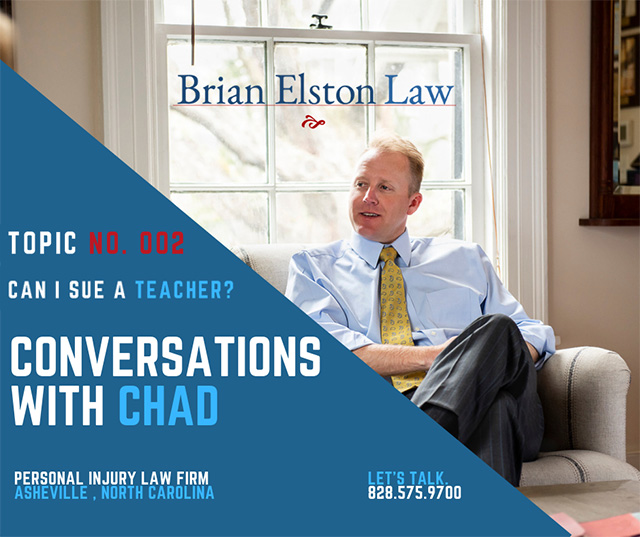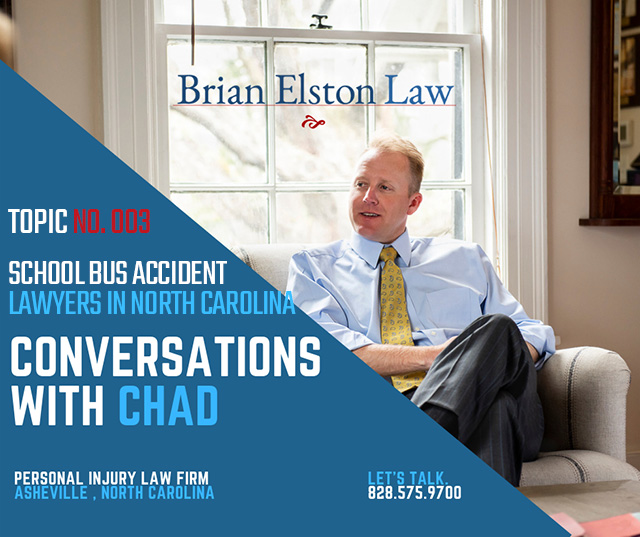TOPIC NO. 002
CAN I SUE A TEACHER?
CONVERSATIONS WITH CHAD
CAN I SUE A TEACHER?
By CHAD DONNAHOO
Students get hurt at school for various reasons. Sometimes, those reasons are nothing more than an unavoidable accident with no one to blame. Sometimes, however, those reasons might have something to do with the actions (or inactions) of your child’s teacher. In these situations, typical legal claims against teachers include negligence and negligent supervision.
01
“THE SHORT ANSWER IS
“YES”.”
Two questions I’m often asked:
1) can I sue a teacher on behalf of my child; and
2) even if I won a lawsuit, would I collect anything?
PERSONAL INJURY LAW FIRM
ASHEVILLE , NORTH CAROLINA
LET’S TALK.
828.575.9700
In North Carolina,
for all legal matters involving minors, the court
requires a Guardian
ad Litem (“GAL”)
No. 1 Can I Sue a Teacher?
The short answer is “yes”. If a teacher did something (or failed to do something) that caused harm to your child, then, depending on the facts and circumstances, it is possible that the teacher engaged in negligent behavior and could be sued in state or federal court.
In North Carolina, certain categories of governmental employees are entitled to public official immunity. This simply means that if their actions were not malicious, corrupt or outside the scope of their official duties, these employees cannot, at a matter of law, be liable for their negligent behavior. In the school system context, employees with public official immunity include school board members, superintendents, directors and principals. Teachers, however, are not entitled to public official immunity and can be liable for their negligent actions.
No. 2 Collecting a Judgment Against a Teacher?
It’s not a secret: teachers are overworked and underpaid. Even if you did win a lawsuit against a teacher, like most people, teachers probably will not have the financial resources to pay the judgment. However, since 2012, the State of North Carolina has provided professional liability insurance for all public school employees, including teachers, who are sued in their individual capacity (the “NC Insurance Policy”). If the teacher’s actions are not malice, corrupt, illegal or outside the scope of employment duties, the teacher will have insurance through the NC Insurance Policy that could be used to satisfy a judgment or to settle a claim.
No. 3 Can I also Sue the Board of Education?
Respondeat superior means “let the master answer”. This is a common legal principle that means employers can be liable for the actions of their employees. In the school system context, if a teacher engages in a negligent act that harms your child, you can sue both the teacher and the board of education since the board is the teacher’s employer. In certain circumstances, the teacher may have insurance through the NC Insurance Policy and the school board may have insurance through another, separate insurance policy. In this circumstance, there is potentially two pots of moneys that can be used to pay a judgment or settle a claim. For more information concerning suing boards of education, check out Conversations with Chad #1 – Governmental Immunity and Boards of Education.
No. 4 If You Win or Reach a Settlement, where does the Money Go?
In North Carolina, for all legal matters involving minors, the court requires a Guardian ad Litem (“GAL”). The GAL is a courtapproved, third-party that is solely responsible for looking out for the minor’s best interest and makes reports to the judge. In all matters involving monies going to a minor, all settlements must be approved by a judge. Any proceeds from a settlement or judgment will be held in trust by the clerk of court until the minor turns 18 years old.
Obviously, suing your child’s teacher is a major decision that requires a lot of thought. It can be a long, stressful process; however, it may be the last and most appropriate way to advocate for your child’s interest.



